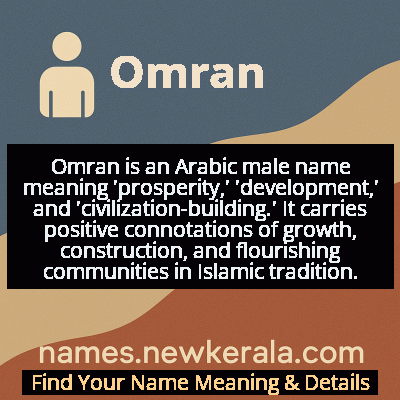Omran Name Meaning & Details
Origin, Popularity, Numerology Analysis & Name Meaning of Omran
Discover the origin, meaning, and cultural significance of the name OMRAN. Delve into its historical roots and explore the lasting impact it has had on communities and traditions.
Name
Omran
Gender
Male
Origin
Muslim
Lucky Number
7
Meaning of the Name - Omran
Omran is an Arabic male name meaning 'prosperity,' 'development,' and 'civilization-building.' It carries positive connotations of growth, construction, and flourishing communities in Islamic tradition.
Omran - Complete Numerology Analysis
Your Numerology Number
Based on Pythagorean Numerology System
Ruling Planet
Neptune (Ketu)
Positive Nature
Intuitive, analytical, spiritual, and inquisitive.
Negative Traits
Secretive, reserved, aloof, and can be overly critical.
Lucky Colours
Green, yellow.
Lucky Days
Monday.
Lucky Stones
Cat’s eye, moonstone.
Harmony Numbers
1, 5, 6.
Best Suited Professions
Scientists, researchers, spiritual leaders, detectives.
What People Like About You
Depth of knowledge, analytical skills, spirituality.
Famous People Named Omran
Omran Daqneesh
Civil war survivor and symbol
Became an international symbol of Syrian civil war suffering after viral image of him bloodied in ambulance
Omran Al-Koumy
Footballer
Egyptian professional footballer who played as goalkeeper for Al Ahly and Egyptian national team
Omran Al-Zoubi
Politician
Syrian Minister of Information and prominent Ba'ath Party figure during Syrian civil war
Omran Shafiq
Academic and writer
Palestinian intellectual and author known for works on Arab identity and political thought
Name Variations & International Equivalents
Click on blue names to explore their detailed meanings. Gray names with will be available soon.
Cultural & Historical Significance
Extended Personality Analysis
Men named Omran typically exhibit characteristics of stability, reliability, and constructive leadership. They are often perceived as grounded individuals with strong organizational skills and a natural inclination toward building and maintaining systems. Their personality reflects the name's meaning of development and prosperity, showing patience in achieving long-term goals and wisdom in decision-making. Omrans tend to be family-oriented, valuing traditions and relationships, while also demonstrating practical problem-solving abilities. They often possess a quiet confidence and are respected for their consistency and integrity. In social settings, they may be more reserved but command respect through their actions rather than words. Their strength lies in their ability to create stability and foster growth in their environments, whether in professional contexts or personal relationships. They typically approach challenges methodically and are known for seeing projects through to completion.
Modern Usage & Popularity
In contemporary naming practices, Omran maintains a steady presence as a traditional yet meaningful choice within Muslim communities globally. While not experiencing the explosive popularity of some modern names, it has consistent usage particularly among families valuing Islamic heritage and meaningful nomenclature. The name sees strongest usage in Arab countries like Syria, Egypt, and Jordan, as well as in Muslim communities in South Asia and the diaspora. Recent years have shown a slight increase in usage as parents seek names with historical depth and positive connotations of development and progress. In Western countries, it remains relatively uncommon but recognizable within Muslim communities, often chosen by families wanting a name that reflects both cultural identity and aspirational values. Its moderate popularity ensures it remains distinctive without being obscure.
Symbolic & Spiritual Meanings
Symbolically, Omran represents the human endeavor to create order, beauty, and prosperity in the world. It embodies the transition from raw potential to realized civilization, symbolizing the process of cultivation and development in all aspects of life. The name carries metaphors of architectural integrity - suggesting strong foundations, careful construction, and lasting impact. It represents the Islamic principle of responsible stewardship of the earth and its resources, emphasizing sustainable growth and community welfare. Omran also symbolizes generational wisdom and legacy, connecting ancestral heritage with future prosperity. In a personal context, it represents character building and moral development, suggesting an individual who continuously works on self-improvement while contributing positively to their community. The name ultimately symbolizes hope for continued progress and the human capacity to build better futures.

